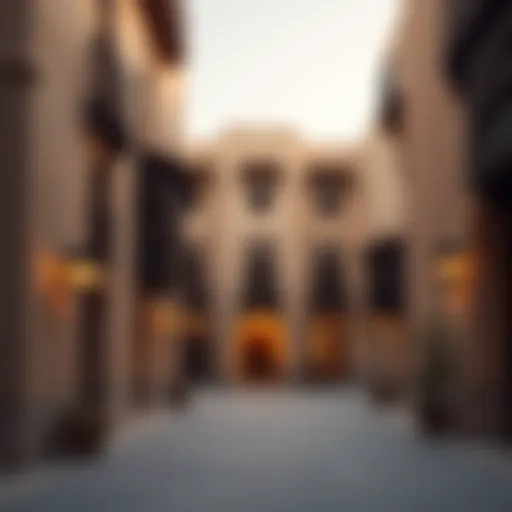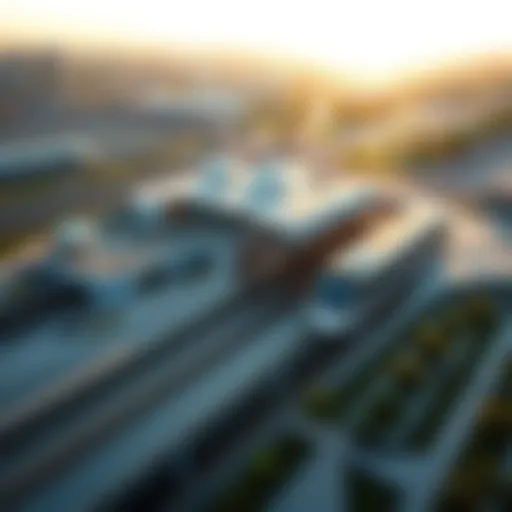Exploring Modern House Designs and Trends in Dubai
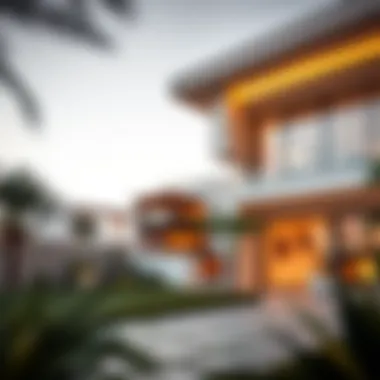

Intro
Dubai is often seen as a symbol of innovation and opulence, and its modern housing developments reflect these attributes in distinctive ways. As urban landscapes evolve, so do the houses within them, presenting a captivating blend of technological advancements, style, and ecological consciousness. Understanding the essence of modern houses in this bustling metropolis requires a close examination of not just their aesthetic appeal but also the underlying trends that shape their emergence.
The residential market in Dubai is not static; it is a thriving entity, where each new building speaks volumes about contemporary design philosophies and lifestyle aspirations. The evolution of these homes showcases shifting attitudes towards living environments—efficient spaces that cater to diverse needs while upholding high standards of luxury and sustainability.
In this article, we will explore the market trends that characterize Dubai's modern housing scene. We will also look into investment opportunities that arise within this framework, offering insights for both seasoned investors and prospective homeowners alike. Whether you are searching for an opulent villa in the Palm Jumeirah or a sleek apartment in Downtown Dubai, understanding what makes these properties appealing is fundamental.
Let's dive deeper into the market trends that are steering this vibrant real estate landscape.
Understanding Modern Architecture
Modern architecture is more than just a visual feast; it's a reflection of the changing times, influenced by technology, culture, and societal needs. In the context of Dubai, an ever-evolving city of contrasts, understanding modern architecture becomes crucial. This exploration highlights not only the aesthetic elements, but also the functional aspects that cater to a diverse and global populace.
The importance of understanding modern architecture in Dubai lies in its ability to adapt and harmonize with the local environment while pushing global boundaries. As the city’s skyline is adorned with striking works of art, it signifies a broader ethos: the blend of luxury and functionality in residential spaces that attract investors and residents alike. Knowledge of modern architecture equips potential homeowners with the insight needed to make informed decisions about their investments.
Moreover, a keen appreciation for modern architectural principles facilitates faster adaptation to new residential trends, influencing market dynamics and personal living choices. The ever-increasing incorporation of technology and sustainable practices in design amplifies this necessity, allowing stakeholders to better navigate the competitive real estate landscape.
Defining Modern Architecture
When one thinks of modern architecture, images of sleek lines, innovative designs, and open spaces often come to mind. However, defining modern architecture encompasses more than just its visual impact. At its core, modern architecture is characterized by simplicity, functionality, and harmony with the environment. It strives to create seamless transitions between the interior and exterior spaces, which is particularly significant in a climate such as Dubai's.
Modern architecture, especially in Dubai, leverages local materials and climate-responsive designs, crafting homes that are not only visually appealing but also energy efficient. The minimalist aesthetic serves as a canvas for occupants to express their individuality, promoting personalized spaces without unnecessary clutter.
Key elements of modern architecture often include:
- Flat surfaces: Emphasizing simplicity and a clean aesthetic.
- Large windows: Maximizing natural light, enhancing the spacious feel.
- Open floor plans: Creating fluid, uninterrupted living areas that foster interaction and connectivity.
Understanding these elements allows investors and homeowners to appreciate the nuances of modern design, ensuring their choices align with current and future trends.
Cultural Influences in Dubai's Architecture
Dubai's architectural landscape is a rich tapestry of cultures reflecting its historical significance as an international trading hub. The modern houses in Dubai are testimonies to this convergence, featuring a blend of Eastern and Western architectural elements.
Many modern houses adopt traditional motifs—such as intricate mashrabiya screens—melding them seamlessly with contemporary materials like glass and steel. This fusion illustrates a respect for heritage even amidst rapid modernization.
The architectural style often draws inspiration from:
- Islamic geometry: Seen in the detailing and façade designs, ensuring a connection to cultural roots.
- Contemporary international styles: Introducing modernity through innovative forms, responsiveness to climate, and sustainable building practices.
This cultural synthesis results in unique homes that meet global standards while remaining rooted in local traditions. Investors and buyers searching for properties in Dubai will benefit from understanding this rich architectural dialogue, as it significantly influences property value and desirability.
Key Characteristics of Modern Houses
The characteristics of modern houses in Dubai are a reflection of both the rapid urban development in the region and the diverse expectations of contemporary lifestyles. These key traits are more than just aesthetic choices; they embody a way of living that harmonizes luxury, functionality, and environmental consciousness. Understanding these characteristics is crucial for anyone looking to invest, design, or simply appreciate the modern architecture that defines this city. By recognizing the underlying principles of modern housing, stakeholders can better navigate the intricate landscape of Dubai’s real estate market.
Minimalist Design
Minimalist design has become a cornerstone of modern architecture in Dubai. This design philosophy eschews excessive ornamentation in favor of clean lines and open spaces, creating a sense of tranquility. What stands out is how this straightforward approach doesn't sacrifice luxury; rather, it enhances it. The focus on essential elements allows for the incorporation of high-quality materials, such as polished concrete, glass, and hardwood that speak to sophistication.
Homeowners find that minimalist design can simplify their lives. With fewer distractions, both the physical space and the mind can breathe easier. This trend also resonates with sustainability; less clutter often means a smaller ecological footprint. Many investors have noted that homes which embrace minimalist design tend to have a broader appeal, attracting a range of buyers from young professionals to families seeking simplicity.
Open Floor Plans
Open floor plans are effectively redefining how spaces in modern houses function. In Dubai's market, these layouts emphasize unity and continuity, breaking down traditional walls to create vast, fluid areas. This design choice serves functional purposes, fostering interaction among residents and highlighting the flow of natural light.
Many families find this layout ideal for entertaining guests or simply enjoying quality time with each other. It allows each room to serve multiple purposes; a living room may transform into a dining area with ease, making daily life more adaptable. Furthermore, open spaces tend to make homes feel larger, which is particularly valuable in urban settings where square footage can be at a premium. According to market analysts, properties featuring open floor plans often command higher resale values due to their desirability.
Use of Natural Light
Another defining characteristic of modern houses in Dubai is their strategic use of natural light. Instead of relying solely on artificial lighting, many modern designs incorporate large windows, skylights, and glass walls to create bright and uplifting interiors. This practice does more than just enhance aesthetics; it positively impacts mental well-being. Natural light is crucial for regulating circadian rhythms and creating a welcoming environment.
The desert landscape offers a unique opportunity for architects to maximize daylight while providing shade from harsh sun rays. By marrying beauty with functionality, these houses utilize energy-efficient glazing techniques, minimizing energy costs while optimizing views of the stunning surroundings. Homeowners who enjoy natural light report significant improvements in mood and productivity, making this feature particularly attractive.
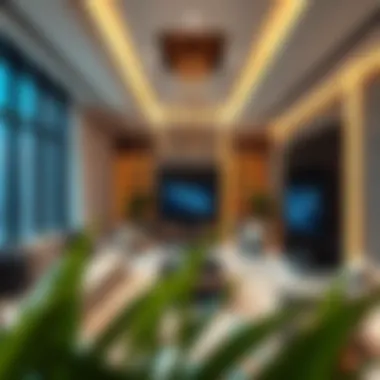

Integration with Nature
The integration of natural elements within modern houses is a trend that extends beyond aesthetics. Many new homes in Dubai strive to blend seamlessly with their outdoor environments, creating a harmonious relationship between indoor living and the natural world. This can manifest in multiple ways, such as through the use of indoor gardens, water features, or simply expansive terraces that open to breathtaking views.
This practice is not only visually appealing but also tremendously beneficial for sustainability. By incorporating features such as green roofs, homeowners actively contribute to environmental health by improving air quality and reducing heat. The benefit goes both ways; designers meticulously consider how the landscape interacts with the built environment ensuring that nature is not just a backdrop but a meaningful part of the living experience. As more buyers become environmentally conscious, these integrative strategies play a significant role in their purchasing decisions.
"Modern homes in Dubai exemplify a blend of form, function, and nature, appealing to the modern buyer's desire for sustainability and comfort."
In summary, the combination of minimalist design, open floor plans, natural light, and integration with nature are key characteristics that define modern houses in Dubai. These elements not only create inviting spaces but also reflect a broader shift towards conscious living, addressing the needs and desires of today’s homeowners and investors alike.
Technological Integration in Homes
In today's fast-paced world, technological integration in homes has become a defining characteristic of modern living, especially in cosmopolitan areas like Dubai. The adoption of innovative tech elements not only enhances comfort and security but also elevates the overall quality of life. As potential buyers and investors explore their options, understanding the role of technology in modern houses becomes increasingly relevant. Smart systems and automation features serve not only practical purposes but also appeal to a demographic that values convenience and efficiency.
Smart Home Innovations
Smart home innovations are revolutionizing how we interact with our living spaces. Imagine controlling your lighting, temperatures, and even security using just your smartphone or voice commands. This level of control transforms a house into a personalized haven. Common examples include:
- Smart Thermostats: Devices like the Nest allow homeowners to regulate their energy use, leading to significant savings.
- Smart Security Systems: Cameras and alarms that can be monitored remotely provide peace of mind while away from home.
- Virtual Assistants: Gadgets such as Amazon Alexa or Google Home act as central hubs for house management, making everyday tasks seamless.
These innovations do not just offer comfort—they can enhance energy efficiency, consequently reducing utility bills. In a city like Dubai, where energy usage can spike, this feature resonates well with residents seeking to balance luxury with sustainability.
Home Automation Systems
Home automation involves connecting various devices within a house, allowing them to communicate and operate together. For instance, when you enter your home, the smart lighting can automatically adjust to your preferences while the thermostat prepares your ideal temperature.
Consider these benefits of home automation systems:
- Enhanced Security: Automatic locking mechanisms and real-time alerts can deter unwanted visitors and alert homeowners to unusual activity.
- Energy Management: Systems that optimize energy use can lower costs and reduce a household's ecological footprint.
- Increased Convenience: For busy homeowners, automating routine tasks cuts down on daily hassle—set schedules for blinds, lights, or even coffee makers to operate at certain times.
It’s essential to consider the compatibility of home automation systems with existing technologies. This allows for comprehensive integration, maximizing functionality in a modern home. More so, the initial investment in such tech can often lead to future savings, making it appealing to investors looking for properties with high resale potential.
"Incorporating smart technology into homes enhances not just the living experience, but also the overall value and desirability of properties in the competitive Dubai real estate market."
By understanding and embracing technological integration, potential homeowners and investors can make informed decisions. This not only supports their modern lifestyle but also aligns with Dubai's vision as a forward-thinking metropolis.
Sustainability and Eco-friendly Designs
Sustainability is not just a buzzword; it's a necessity in today's rapidly changing world. In Dubai, where modern houses are sprouting up like daisies, integrating sustainability and eco-friendly designs into the architecture and urban planning is crucial for a number of reasons. First and foremost, the environmental challenges faced globally, like climate change and resource depletion, raise the stakes for cities such as Dubai. Here, the balance between luxurious living and ecological responsibility becomes increasingly pertinent.
By focusing on sustainable practices in construction and design, Dubai's real estate market can not only meet the needs of its residents but also ensure a healthier planet for future generations. Homebuyers are more aware than ever, often seeking properties that incorporate these eco-friendly features.
Green Building Materials
Using green building materials is vital for creating sustainable houses. These materials often boast low environmental impact and can contribute to energy savings down the line. Here are some examples of what qualifies as green:
- Recycled Materials: Building homes with materials that have been repurposed helps reduce waste. For instance, using reclaimed wood or recycled steel not only cuts down on new resources needed but also gives residences a unique character.
- Bamboo: This grass grows rapidly and can be harvested sustainably. In construction, its strength and flexibility make it a fantastic alternative to traditional timber.
- Low-VOC Products: Volatile Organic Compounds can be harmful to indoor air quality. By choosing paints, sealants, and adhesives that have low or zero VOC emissions, homeowners can significantly enhance their living environment.
Utilizing these materials doesn't come without considerations. Homeowners and builders alike must stay informed about the long-term efficacy of these choices. For instance, while bamboo is eco-friendly, its durability can vary widely based on processing techniques. Making informed decisions plays an essential role in truly sustainable building.
Energy-efficient Features
Energy efficiency is another pillar of eco-friendly designs, and it's something that resonates deeply with homeowners and investors alike. By implementing energy-efficient features, houses not only help lower energy costs but also extend their longevity through reduced strain on shared resources. Key features include:
- Solar Panels: Harnessing the sun’s energy is an obvious choice in a place that enjoys abundant sunlight. Solar panels are increasingly becoming a standard in modern houses, allowing homeowners to generate their own electricity while potentially receiving rebates or incentives.
- Energy-efficient Windows: Specially coated or triple-glazed windows can significantly reduce heat loss, keeping homes cooler in the harsh Dubai sun and reducing the need for excessive air conditioning.
- High-efficiency Appliances: Appliances designed to use less energy and water are becoming staples in newer homes. The investment in energy-efficient models will pay off in savings, serving both practicality and environmental responsibility.
In closing, sustainability in modern homes isn't just about compliance or optics; it’s about a conscious effort toward promoting a thriving, resilient community. As investors and home buyers look to the future, understanding these elements will undoubtedly play a vital role in the choices they make.
"To build a sustainable future, investing in eco-friendly houses is not just an option but a responsibility for every new homeowner."
For resources on sustainability practices in architecture, you may visit Wikipedia or Britannica.
Luxury Amenities and Features
In the world of modern housing, especially in a vibrant and rapidly evolving metropolis like Dubai, luxury amenities and features can make or break a property. These features not only elevate the aesthetic appeal of a home but also significantly enhance the overall living experience. Modern house buyers often seek these luxurious touches, making them an essential focus for any serious real estate investment or purchase.
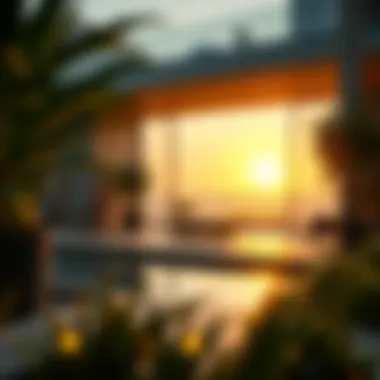

Swimming Pools and Outdoor Spaces
When thinking about luxury in modern homes, swimming pools bring a certain wow factor that’s hard to ignore. In Dubai, with its sun-drenched days, a private pool becomes more than just a luxury; it's a lifestyle choice. Many properties feature exquisite infinity pools that blend seamlessly with the horizon, creating stunning visual experiences.
But it doesn't stop there. Outdoor spaces, such as landscaped gardens and entertainment areas, further amplify the home’s allure. Picture a backyard with a meticulously crafted patio, complete with a barbecue grill and an outdoor lounge, where evenings are spent under a blanket of stars, or a simple sundrenched terrace with shaded cabanas. These spaces provide a sanctuary from the bustling city life and an inviting atmosphere for hosting friends.
*"In Dubai, a pool isn't just a feature; it’s a statement of luxury and relaxation."
Gourmet Kitchens
Another hallmark of luxury in modern houses is the gourmet kitchen. These kitchens serve as the bustling heart of the home. They combine top-of-the-line appliances from brands like Sub-Zero and Wolf with sleek countertops made of high-quality materials, such as quartz or granite, which are not only durable but also visually striking.
Design plays a crucial role here, with many Dubai homes embracing an open floor plan that encourages social interactions. A kitchen island can be the perfect gathering spot for family and friends, fostering a sense of community. Moreover, smart appliances have also made their way into these lavish kitchens, allowing homeowners to manage their cooking tasks remotely. Who wouldn’t want to preheat the oven while stuck in traffic?
Incorporating a gourmet kitchen into your home not only reflects an appreciation for the culinary arts but also boosts the overall property value. Buyers are often willing to pay a premium for such features, making them a wise choice for investors.
Market Trends in Dubai Real Estate
Understanding the market trends in Dubai's real estate sector is essential for investors and homeowners alike. The city has emerged as a key player in the global real estate market in recent years. Several driving forces influence these changes. These include economic growth, population influx, and evolving consumer preferences. Real estate trends in this vibrant city reflect a keen balance between luxury and functionality, often intertwined with cultural influences and modernization.
Current Investment Opportunities
One cannot deny the myriad investment opportunities available in Dubai’s real estate landscape presently. With various government initiatives aiming to attract foreign investment, potential buyers find themselves in a favorable environment. Areas like Dubai Marina and Downtown Dubai showcase luxury apartments featuring stunning views and amenities, making them sought-after locations for investment. Moreover, emerging neighborhoods such as Dubai South are gaining traction, particularly among those looking for more spacious living options at lower prices.
Potential investors should carefully scrutinize the types of developments available. Properties that offer ready-to-move-in options tend to attract more interest, particularly among expatriates. Additionally, off-plan projects often come with attractive payment plans, making it easier for buyers to manage their finances.
- Key areas of focus for investment include:
- Waterfront properties, providing not just views but premium experiences.
- Gated communities, attracting families for their safety and amenities.
- Properties near upcoming metro lines, ensuring great connectivity.
It’s worth noting that while the luxury sector garners significant attention, the mid-range housing market also presents sound investment potential. This category caters to Dubai’s growing population while providing a reasonable return on investment in the long term.
Forecasting Future Developments
As Dubai gears up for the post-COVID-19 era, experts predict a significant upswing in real estate growth driven by an increasingly diverse market. This growth could well be accelerated by large events, such as Expo 2020. Investors who keep an eye on upcoming infrastructural developments will likely reap the benefits of their foresight.
An essential factor for predicting future developments encompasses government regulations and policies. The introduction of long-term visas and special economic zones aims to enhance the investment environment considerably. These changes are making Dubai a more attractive hub for expatriates and entrepreneurs, in turn driving demand for residential properties.
In addition, shifting consumer preferences towards mixed-use developments hint at future trends in the housing market. Potential buyers are increasingly seeking homes that seamlessly integrate living, working, and leisure spaces. Such urban designs not only cater to a modern lifestyle but also promote a sense of community.
Ultimately, staying informed and adaptable to these trends will be crucial for anyone interested in investing in Dubai’s real estate market. With a vibrant mix of old and new, navigating the real estate landscape requires diligence, but the rewards can be significant for those willing to learn the ropes.
"Understanding the evolving landscape of Dubai's real estate market is key to making informed decisions and maximizing investment potential."
Community Living and Lifestyle
Community living is a cornerstone of the modern lifestyle, especially in a bustling metropolis like Dubai. With its rapid growth and diversity, living arrangements in Dubai are evolving, shaping not just how people reside but how they interact with their environment and each other. This section delves into the features, benefits, and overarching lifestyle implications of community living that are characteristic of modern houses in Dubai.
Benefits of Gated Communities
Gated communities offer a unique charm that draws many potential homeowners and investors. They provide a sense of security that is invaluable in today’s world. Residents can feel at ease knowing that access is restricted, often monitored by security personnel. In addition to safety, gated communities foster a neighborhood camaraderie that is often less prevalent in more traditional settings.
Some key benefits of gated communities include:
- Enhanced Security: With controlled access points and surveillance systems, families can enjoy peace of mind.
- Common Amenities: Residents often have access to swimming pools, gyms, and parks within these communities, promoting relaxation and recreational activities.
- Social Cohesion: The design encourages interactions among neighbors, making it easier to build friendships and create a sense of belonging.
- Well-Maintained Spaces: These communities typically benefit from regular upkeep, contributing to a more aesthetically pleasing environment.
Notably, the sense of exclusivity that comes with gated living appeals to those looking for a sophisticated lifestyle. This environment allows for a heightened level of comfort and convenience, appealing to both families and professionals alike.
Social Infrastructure in Dubai
Dubai stands out for its robust social infrastructure, which is integral to the quality of life in community living settings. This infrastructure includes schools, healthcare facilities, shopping centers, and entertainment venues strategically located to enhance accessibility for residents.
- Educational Institutions: With schools that offer various curriculums catering to a multicultural population, families benefit from high educational standards. Many communities are in proximity to esteemed academic institutions, ensuring that children receive a quality education.
- Healthcare Access: The availability of world-class medical facilities nearby is a significant advantage. Many gated communities are just a short drive from hospitals and clinics, allowing for prompt medical assistance when needed.
- Shopping and Leisure: Dubai is known for its exceptional retail options—from luxury malls to local markets. Communities often boast nearby shopping districts that cater to diverse tastes, combined with entertainment options that promote a balanced lifestyle.
- Public Transport: A well-connected public transport system enhances mobility, making it easy for residents to commute and explore the wider city without hassle.
The effective design of social infrastructure in Dubai underpins a thriving community lifestyle where the well-being of residents is at the forefront.


Legal Considerations for Homebuyers
When diving into the vibrant tapestry of Dubai's real estate market, legal considerations form the bedrock upon which home ownership is built. Understanding these intricacies can make the difference between a seamless purchase and a troublesome ordeal. Buyers, especially those from overseas, need to navigate a complex web of property laws, regulations, and rights before making investment decisions.
Understanding Property Laws
Dubai's property laws are distinct, shaped by its rapid development and increasing economic diversification. The legal framework governing real estate transactions in Dubai rests primarily on the Dubai Land Department (DLD) regulations. This department oversees property registration, ensuring both buyers and sellers are protected under the law.
To embark on a house purchase journey, one must first grasp the different types of properties available. Freehold properties allow buyers to own the land, offering full ownership rights. Conversely, leasehold properties come with specific time-bound agreements, often not exceeding 99 years.
It’s also crucial to be mindful of the Strata Law, which governs the management of communities and buildings. This law ensures that individual homeowners have a say in the governance of common areas, a vital factor for those considering life in a gated community or multi-unit building.
"A thorough understanding of property laws in Dubai is not just advisable; it is essential for safeguarding investments."
Another aspect worth noting is the Registration Fee that homebuyers are required to pay, usually around 4% of the property value. This is planned least to ensure transparency and security in transactions. Potential buyers should also pay heed to the additional costs involved in property acquisition, such as maintenance fees and community charges, which can shape the overall investment picture.
Rights of Foreign Investors
In an age where borders seem to dissolve in the face of opportunities, foreign investors find Dubai remarkably inviting. The legal provisions in place offer foreign nationals the ability to own property in designated areas, expanding the market potential significantly. Understanding those rights is key to a successful venture into Dubai’s real estate.
Foreign investors are typically allowed to own freehold properties in various designated zones. This means they can enjoy the full gamut of ownership rights akin to local citizens. As with all investments, due diligence becomes paramount. This entails assessing not just the property itself but the regulations governing ownership.
Additionally, buyers should be aware of their entitlement to secure property loans from local banks, in many instances up to 75% of the property's value. However, this can vary based on the investor’s status and the financial institution's policies.
Navigating the legal maze with the help of a knowledgeable real estate agent can ease uncertainties. Experienced agents can clarify the documents needed, from title deeds to no-objection certificates, ensuring all paperwork aligns with Dubai’s legal standards.
Real Estate Investment Strategies
When it comes to modern houses in Dubai, understanding real estate investment strategies is crucial for potential homeowners and investors alike. Investing in property is not just about buying a house; it's about making informed decisions that can lead to substantial returns and fostering a wealth-generating portfolio. The dynamic landscape of Dubai's real estate market presents a plethora of opportunities, but navigating through these requires a keen awareness of various strategies that are most effective in maximizing value.
Real estate in Dubai is often considered a high-stakes game, influenced by global economic conditions, local regulations, and ever-shifting demand curves. Having a well-rounded strategy can safeguard your investment and pave the way for lucrative gains.
Evaluating Investment Risk
Evaluating investment risk is a pivotal aspect of real estate strategy. In hotels, airy apartments, and lavish villas sprawled across the Emirate, one might think that investing in property is a safe bet. However, without rigorously assessing risk, investors can find themselves swimming in murky waters.
Factors to consider when evaluating potential risks include:
- Market Trends: Understand the current state of the market by studying price trends and forecasting future demands. Since Dubai has distinct neighborhoods, it's essential to analyze trends specific to each area.
- Regulatory Environment: Familiarize yourself with the laws surrounding property ownership in Dubai. This includes knowing about potential changes in pricing regulations or foreign ownership limits.
- Economic Indicators: Economic health goes a long way in determining property values. Monitor local employment rates and overall economic growth to gauge housing market stability.
- Property Condition: Assess the physical condition of the property itself. Identifying potential repairs or renovations can save a lot of anguish down the line, as hidden expenses could eat away at returns.
A thorough risk assessment can help you create a safety net against poor investment decisions. This not only leads to a solid foundation for future growth but also lets you sleep soundly at night.
Maximizing Return on Investment
After laying the groundwork by evaluating risks, the next step is to focus on how to maximize return on investment (ROI). The returns on property investments in Dubai can be bouyant when approached thoughtfully. Here are some methods to increase your ROI:
- Location Selection: Location is the golden rule of real estate. Properties in prime areas, close to amenities and transport links, tend to appreciate faster and attract more tenants.
- Property Upgrades: Small enhancements can yield significant returns. Upgrading kitchens, installing modern fixtures or energy-efficient appliances can make your property more appealing to renters or buyers.
- Diversified Portfolio: Consider investing in different types of properties. Don’t just focus on residential houses; commercial properties like retail spaces could offer higher rental yields.
- Effective Marketing: The power of good marketing can't be underestimated. Utilize social media, online listings, and local agents to attract potential buyers or tenants. Highlight the unique features of your property to stand out.
- Long-term vs. Short-term Rentals: Decide on your rental strategy. While long-term rentals provide steadiness, short-term rentals can lead to higher monthly incomes, especially in tourist-rich areas.
A carefully crafted strategy focusing on these elements can effectively enhance not only immediate cash flow but also long-term capital appreciation. By keeping an eye on potential pitfalls and honing in on growth opportunities, investors can navigate the lively waters of Dubai's real estate market with confidence.
"In real estate investment, it's not about the property itself, but how you see and use it that counts most in the end."
By leveraging well-thought-out real estate investment strategies, potential homeowners and real estate enthusiasts can position themselves to thrive in a city that’s always on the move, ensuring they reap the rewards that modern houses in Dubai have to offer.
Ending
When we think about modern houses in Dubai, it's not just about the fancy façades or lavish living spaces. The real crux of this topic lies in its broader implications. This segment emphasizes the key takeaways of our exploration, underscoring the value these insights hold for a diverse audience, from investors to potential homeowners.
Real estate in Dubai is a microcosm of innovation, merging traditional values with cutting-edge technology and design. While diving deep into the essence of modern houses, we've seen how architecture in Dubai reflects the city's cultural backdrop. With influences ranging from Islamic art to contemporary styles, these structures are not merely places to live; they are visual narratives that tell a story of progress and luxury.
Highlights of this exploration illustrate:
- The adoption of sustainable practices, which are not just trendy but crucial for the environment.
- The technological advancements that shape daily living, making life not only easier but also more connected.
- The aesthetic appeal of modern designs nestled within the striking landscapes of Dubai.
Investors can glean understanding from these layers—recognizing that value is embedded in both the tangible and intangible merits of modern homes. The merging of luxury with practicality isn’t just appealing; it's a forward-thinking approach that meets market demands.
"Understanding these nuances is essential for navigating the complex real estate landscape in Dubai."
Moreover, for residents, it is about the quality of life. Features such as natural light, open spaces, and community-oriented designs foster a sense of belonging and well-being. The available amenities support a lifestyle that is not just lavish but also enriching.
As we look forward to the future of Dubai’s real estate market, these insights act as a compass, guiding decisions and shaping expectations. Recognizing the integral relationship between modern architecture and the lifestyle it promotes sparks a deeper understanding—both of the market and our individual needs as stakeholders therein.

